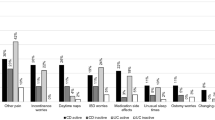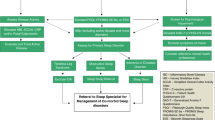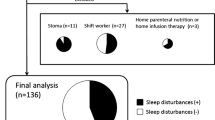Abstract
Purpose of review
Studies have suggested that sleep and inflammatory bowel disease (IBD) appear to have an important bi-directional relationship, where active disease promotes sleep disruption and poor sleep promotes ongoing and worsening inflammation. In the geriatric population, poor sleep has been linked to increasing morbidity and mortality. The etiologies of poor sleep in the elderly are multifactorial and are understood to be a part of the geriatric syndromes, conditions in the elderly associated with poorer mortality and morbidity. We review the current literature regarding the common sources of sleep disturbances in the geriatric population and, by extension, the growing population of elderly patients with IBD.
Recent findings
There is a high prevalence of sleep dysfunction in patients with inflammatory bowel disease, not only in patients in disease remission but also in patients with active disease. Poor sleep has been suggested a potential marker of ongoing subclinical inflammation, and sleep disturbances are linked to poorer outcomes in patients with IBD. Management of inflammation appears to improve fatigue symptoms but is not linked with the elimination of symptoms. Thus, alternative etiologies of poor sleep, especially in the geriatric population, include chronic medical conditions with polypharmacy, co-morbid mood disorders, and primary disorders of sleep.
Summary
Sleep disturbances in the elderly patient with IBD are related to multiple etiologies. Poor sleep is linked to both worse disease–specific outcomes and higher morbidity and mortality. Coordination of care with geriatricians, mental health professionals, and sleep specialists is often required to target the appropriate cause. We provide an etiological framework in the assessment of poor sleep in the elderly patient with IBD.


Similar content being viewed by others
References and Recommended Reading
Papers of particular interest, published recently, have been highlighted as:• Of importance •• Of major importance
Gisbert JP, Chaparro M. Systematic review with meta-analysis: inflammatory bowel disease in the elderly. Aliment Pharmacol Ther. 2014;39:459–77.
The incidence of ulcerative colitis (1995-2011) and Crohn’s disease (1995-2012) - based on nationwide Danish registry data. - PubMed - NCBI. Available at: https://www-ncbi-nlm-nih-gov.ezproxy.bu.edu/pubmed/?term=The+incidence+of+ulcerative+colitis+(1995-2011). (Accessed: 14th May 2019)
Charpentier C, et al. Natural history of elderly-onset inflammatory bowel disease: a population-based cohort study. Gut. 2014;63:423–32.
Ali T, Madhoun MF, Orr WC, Rubin DT. Assessment of the relationship between quality of sleep and disease activity in inflammatory bowel disease patients. Inflamm Bowel Dis. 2013;19:2440–3.
Graff LA, et al. A population-based study of fatigue and sleep difficulties in inflammatory bowel disease. Inflamm Bowel Dis. 2011;17:1882–9.
Foley DJ, et al. Sleep complaints among elderly persons: an epidemiologic study of three communities. Sleep. 1995;18:425–32.
da Silva AA, et al. Sleep duration and mortality in the elderly: a systematic review with meta-analysis. BMJ Open. 2016;6:e008119.
Inouye SK, Studenski S, Tinetti ME, Kuchel GA. Geriatric syndromes: clinical, research, and policy implications of a core geriatric concept. J Am Geriatr Soc. 2007;55:780–91.
Borbély AA, Daan S, Wirz-Justice A, Deboer T. The two-process model of sleep regulation: a reappraisal. J Sleep Res. 2016;25:131–43.
Daan S, Beersma DG, Borbély AA. Timing of human sleep: recovery process gated by a circadian pacemaker. Am J Phys. 1984;246:R161–83.
Porkka-Heiskanen T, Kalinchuk AV. Adenosine, energy metabolism and sleep homeostasis. Sleep Med Rev. 2011;15:123–35.
Moore RY. A clock for the ages. Science. 1999;284:2102–3.
Ohayon MM, Carskadon MA, Guilleminault C, Vitiello MV. Meta-analysis of quantitative sleep parameters from childhood to old age in healthy individuals: developing normative sleep values across the human lifespan. Sleep. 2004;27:1255–73.
Haimov I, Lavie P. Circadian characteristics of sleep propensity function in healthy elderly: a comparison with young adults. Sleep. 1997;20:294–300.
Bliwise DL, Ansari FP, Straight L-B, Parker KP. Age changes in timing and 24-hour distribution of self-reported sleep. Am J Geriatr Psychiatry Off J Am Assoc Geriatr Psychiatry. 2005;13:1077–82.
Münch M, et al. The frontal predominance in human EEG delta activity after sleep loss decreases with age. Eur J Neurosci. 2004;20:1402–10.
Czeisler CA, et al. Stability, precision, and near-24-hour period of the human circadian pacemaker. Science. 1999;284:2177–81.
Monk TH. Aging human circadian rhythms: conventional wisdom may not always be right. J Biol Rhythm. 2005;20:366–74.
Buysse DJ, Monk TH, Carrier J, Begley A. Circadian patterns of sleep, sleepiness, and performance in older and younger adults. Sleep. 2005;28:1365–76.
Imeri L, Opp MR. How (and why) the immune system makes us sleep. Nat Rev Neurosci. 2009;10:199–210.
Krueger JM. The role of cytokines in sleep regulation. Curr Pharm Des. 2008;14:3408–16.
Orr WC. Sleep and gastrointestinal disease: a new horizon in sleep medicine. Sleep Med. 2009;10:595–6.
Dimitrov S, Lange T, Fehm HL, Born J. A regulatory role of prolactin, growth hormone, and corticosteroids for human T-cell production of cytokines. Brain Behav Immun. 2004;18:368–74.
Vgontzas AN, Chrousos GP. Sleep, the hypothalamic-pituitary-adrenal axis, and cytokines: multiple interactions and disturbances in sleep disorders. Endocrinol Metab Clin N Am. 2002;31:15–36.
Ananthakrishnan AN, et al. Sleep duration affects risk for ulcerative colitis: a prospective cohort study. Clin Gastroenterol Hepatol Off Clin Pract J Am Gastroenterol Assoc. 2014;12:1879–86.
Zimmerman J. Extraintestinal symptoms in irritable bowel syndrome and inflammatory bowel diseases: nature, severity, and relationship to gastrointestinal symptoms. Dig Dis Sci. 2003;48:743–9.
Ranjbaran Z, et al. Impact of sleep disturbances in inflammatory bowel disease. J Gastroenterol Hepatol. 2007;22:1748–53.
Graff LA, et al. Changes in fatigue over 2 years are associated with activity of inflammatory bowel disease and psychological factors. Clin Gastroenterol Hepatol Off Clin Pract J Am Gastroenterol Assoc. 2013;11:1140–6.
Gingold-Belfer R, et al. Impaired sleep quality in Crohn’s disease depends on disease activity. Dig Dis Sci. 2014;59:146–51.
Ali T, Madhoun MF, Crosby A, Orr WC, Rubin DT. 43 Poor sleep quality predicts disease relapse in patients with inflammatory bowel disease. Gastroenterology. 2013;144:S-12.
Ananthakrishnan AN, Long MD, Martin CF, Sandler RS, Kappelman MD. Sleep disturbance and risk of active disease in patients with Crohn’s disease and ulcerative colitis. Clin Gastroenterol Hepatol Off Clin Pract J Am Gastroenterol Assoc. 2013;11:965–71.
Wilson RG, et al. High C-reactive protein is associated with poor sleep quality independent of nocturnal symptoms in patients with inflammatory bowel disease. Dig Dis Sci. 2015;60:2136–43.
•• Stevens BW, et al. Vedolizumab therapy is associated with an improvement in sleep quality and mood in inflammatory bowel diseases. Dig Dis Sci. 2017;62:197–206. Recent study suggesting improvement in not only sleep quality but also mood symptoms following the initiation of biologic therapy in IBD patients.
•• Borren NZ, et al. Sa1861 – impact of biologic therapy on resolution of fatigue symptoms in patients with active inflammatory bowel disease: a prospective cohort study. Gastroenterology. 2019;156:S-431–2. Recent study suggesting that biologic therapy is not associated with symptoms of improvement in fatigue.
Michalpoulos G, et al. Association of sleep quality and mucosal healing in patients with inflammatory bowel disease in clinical remission. Ann Gastroenterol. 2018;31:211–6.
Sofia M, et al. P207 Poor sleep quality is a risk factor for hospitalization and surgery in Crohn’s disease. J Crohns Colitis. 2018;12:S188–9.
• Hood MM, et al. Sleep quality in ulcerative colitis: associations with inflammation, psychological distress, and quality of life. Int J Behav Med. 2018;25:517–25. Recent study investigating both depressive symptoms and sleep quality in adult patients with IBD. The authors demonstrated depression linked to poor sleep quality.
Chrobak AA, et al. Associations between chronotype, sleep disturbances and seasonality with fatigue and inflammatory bowel disease symptoms. Chronobiol Int. 2018;35:1142–52.
Zargar A, Gooraji SA, Keshavarzi B, Haji Aghamohammadi AA. Effect of irritable bowel syndrome on sleep quality and quality of life of inflammatory bowel disease in clinical remission. Int J Prev Med. 2019;10:10.
• Chakradeo PS, et al. Chronotype, social jet lag, sleep debt and food timing in inflammatory bowel disease. Sleep Med. 2018;52:188–95. First large study assessing the role of circadian disruption and poor sleep in IBD and suggesting circadian disruption associated with a more severe phenotype of Crohn’s disease.
Liu X, Yu R, Zhu L, Hou X, Zou K. Bidirectional regulation of circadian disturbance and inflammation in inflammatory bowel disease. Inflamm Bowel Dis. 2017;23:1741–51.
Burgess H, et al. Endogenous melatonin profiles in asymptomatic inflammatory bowel disease. Scand J Gastroenterol. 2010;45:759–61.
• Bar-Gil Shitrit A, et al. Sleep disturbances can be prospectively observed in patients with an inactive inflammatory bowel disease. Dig Dis Sci. 2018;63:2992–7. Largest study to date assessing polysomnographic variables in IBD patients. IBD patients found to have not only less REM sleep but also with longer periods of hypoxia in comparison to controls.
Sofia M, et al. P178 Sleep fragmentation measured by wearable device is an indicator of clinical disease activity in inflammatory bowel disease. J Crohns Colitis. 2018;12:S188–9.
Keefer L, Stepanski EJ, Ranjbaran Z, Benson LM, Keshavarzian A. An initial report of sleep disturbance in inactive inflammatory bowel disease. J Clin Sleep Med JCSM Off Publ Am Acad Sleep Med. 2006;2:409–16.
van Langenberg DR, Papandony MC, Gibson PR. Sleep and physical activity measured by accelerometry in Crohn’s disease. Aliment Pharmacol Ther. 2015;41:991–1004.
Paixão D, et al. Evaluation of home polysomnography findings, quality of sleep and fatigue in inflammatory bowel disease: a case series. JCSM. 2019;15:39–45.
• Qazi T, et al. The use of actigraphy differentiates sleep disturbances in active and inactive Crohn’s disease. Inflamm Bowel Dis. 2018. https://doi.org/10.1093/ibd/izy324. Largest actigraphy-based study of Crohn’s patients suggesting poorer actigraphic sleep parameters in patients with active Crohn’s disease compared to subjects in disease remission.
Byers AL, Yaffe K, Covinsky KE, Friedman MB, Bruce ML. High occurrence of mood and anxiety disorders among older adults: the National Comorbidity Survey Replication. Arch Gen Psychiatry. 2010;67:489–96.
Beekman AT, Copeland JR, Prince MJ. Review of community prevalence of depression in later life. Br J Psychiatry J Ment Sci. 1999;174:307–11.
American Psychiatric Association. Diagnostic and statistical manual of mental disorders. American Psychiatric Association. 2013. https://doi.org/10.1176/appi.books.9780890425596.
2009 Sleep in America Poll—health and safety. Sleep Health 1, e8 (2015).
Li C, Friedman B, Conwell Y, Fiscella K. Validity of the Patient Health Questionnaire 2 (PHQ-2) in identifying major depression in older people. J Am Geriatr Soc. 2007;55:596–602.
Arriaga F, Lara E, Matos-Pires A, Cavaglia F, Bastos L. Diagnostic relevance of sleep complaints in anxiety and mood disorders. Eur Psychiatry J Assoc Eur Psychiatr. 1995;10:386–90.
Brenes GA, et al. Insomnia in older adults with generalized anxiety disorder. Am J Geriatr Psychiatry Off J Am Assoc Geriatr Psychiatry. 2009;17:465–72.
Breslau N, Roth T, Rosenthal L, Andreski P. Sleep disturbance and psychiatric disorders: a longitudinal epidemiological study of young adults. Biol Psychiatry. 1996;39:411–8.
Balsamo M, Cataldi F, Carlucci L, Fairfield B. Assessment of anxiety in older adults: a review of self-report measures. Clin Interv Aging. 2018;13:573–93.
Harris MJ, Jeste DV. Late-onset schizophrenia: an overview. Schizophr Bull. 1988;14:39–55.
Benhayon D, et al. Characterization of relations among sleep, inflammation, and psychiatric dysfunction in depressed youth with Crohn disease. J Pediatr Gastroenterol Nutr. 2013;57:335–42.
Seetho IW, Wilding JPH. Sleep-disordered breathing, type 2 diabetes and the metabolic syndrome. Chron Respir Dis. 2014;11:257–75.
Logan A. Sleep-disordered breathing and hypertension. Am J Respir Crit Care Med. 2009;179:1082–3.
Phillips B, Hening W, Britz P, Mannino D. Prevalence and correlates of restless legs syndrome: results from the 2005 National Sleep Foundation Poll. Chest. 2006;129:76–80.
Prince M, et al. The global prevalence of dementia: a systematic review and metaanalysis. Alzheimers Dement J Alzheimers Assoc. 2013;9:63–75.e2.
Plassman BL, et al. Prevalence of dementia in the United States: the aging, demographics, and memory study. Neuroepidemiology. 2007;29:125–32.
Moran M, et al. Sleep disturbance in mild to moderate Alzheimer’s disease. Sleep Med. 2005;6:347–52.
Charlesworth CJ, Smit E, Lee DSH, Alramadhan F, Odden MC. Polypharmacy among adults aged 65 years and older in the United States: 1988–2010. J Gerontol A Biol Sci Med Sci. 2015;70:989–95.
Gillin JC, Jacobs LS, Fram DH, Snyder F. Acute effect of a glucocorticoid on normal human sleep. Nature. 1972;237:398–9.
In E, et al. Sleep quality is related to disease activity in patients with ankylosing spondylitis: a polysomnographic study. JCR J Clin Rheumatol. 2016;22:248.
Taylor-Gjevre RM, Gjevre JA, Nair BV, Skomro RP, Lim HJ. Improved sleep efficiency after anti-tumor necrosis factor α therapy in rheumatoid arthritis patients. Ther Adv Musculoskelet Dis. 2011;3:227–33.
Bradley TD, Floras JS. Sleep apnea and heart failure: part II: central sleep apnea. Circulation. 2003;107:1822–6.
Naughton MT, Kee K. Sleep apnoea in heart failure: to treat or not to treat? Respirol Carlton Vic. 2017;22:217–29.
Young T, et al. Predictors of sleep-disordered breathing in community-dwelling adults: the Sleep Heart Health Study. Arch Intern Med. 2002;162:893–900.
Ancoli-Israel S, et al. Morbidity, mortality and sleep-disordered breathing in community dwelling elderly. Sleep. 1996;19:277–82.
Nagappa M, et al. Validation of the STOP-Bang Questionnaire as a screening tool for obstructive sleep apnea among different populations: a systematic review and meta-analysis. PLoS One. 2015;10:e0143697.
Ancoli-Israel S, et al. Periodic limb movements in sleep in community-dwelling elderly. Sleep. 1991;14:496–500.
Rothdach AJ, Trenkwalder C, Haberstock J, Keil U, Berger K. Prevalence and risk factors of RLS in an elderly population: the MEMO study. Memory and Morbidity in Augsburg Elderly. Neurology. 2000;54:1064–8.
• Takahara I, et al. Prevalence of restless legs syndrome in patients with inflammatory bowel disease. Dig Dis Sci. 2017;62:761–7. Restless legs syndrome is common in patients with IBD and is associated with pooerer sleep quality.
Boeve BF. REM sleep behavior disorder: updated review of the core features, the REM sleep behavior disorder-neurodegenerative disease association, evolving concepts, controversies, and future directions. Ann N Y Acad Sci. 2010;1184:15–54.
Sateia MJ. International classification of sleep disorders-third edition: highlights and modifications. Chest. 2014;146:1387–94.
Author information
Authors and Affiliations
Corresponding author
Ethics declarations
Conflict of Interest
Taha Qazi declares that he has no conflict of interest. Francis A. Farraye declares that he has no conflict of interest
Human and Animal Rights and Informed Consent
This article does not contain any studies with human or animal subjects performed by any of the authors.
Additional information
Publisher’s Note
Springer Nature remains neutral with regard to jurisdictional claims in published maps and institutional affiliations.
This article is part of the Topical Collection on Gastroenterology for Geriatric Patients
Rights and permissions
About this article
Cite this article
Qazi, T., Farraye, F.A. Sleep Disturbances in the Elderly Patient with Inflammatory Bowel Disease. Curr Treat Options Gastro 17, 470–491 (2019). https://doi.org/10.1007/s11938-019-00258-x
Published:
Issue Date:
DOI: https://doi.org/10.1007/s11938-019-00258-x




